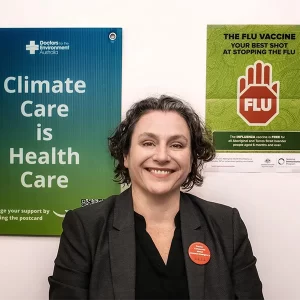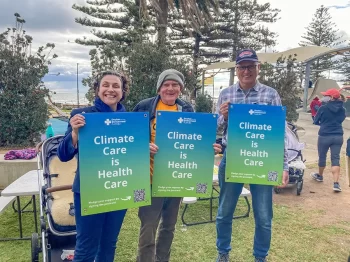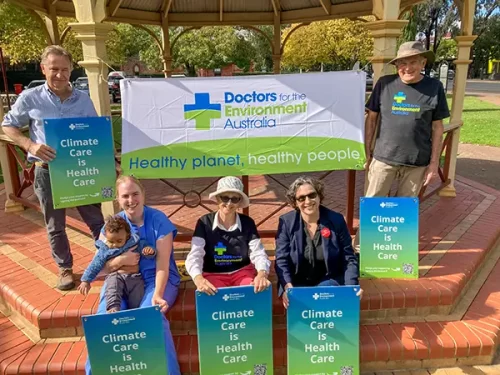Healthy planet, healthy people:
For Dr Kate Wylie, joining Doctors for the Environment Australia felt like a natural extension of her work as a general practitioner.
“GPs are on the frontline, we see patients who are dealing with the impacts of climate change,” Dr Wylie said.
“Climate change is a health issue, we need to treat it just like we treat any other life-threatening health problem.”
Currently working at a health centre in Adelaide’s north-eastern suburbs, Dr Wylie has been a GP for 16 years. She joined DEA in 2016 and took on the position as Chair in February this year.
DEA has 2500 members nationally, comprising doctors and medical students. Membership is free for medical students.
Dr Wylie said she has “always been concerned about the environment” and became aware of DEA when she read about a group of doctors and medical students who protested to oppose the development of a coal mine in NSW’s northeast.
She explains that GPs can contribute to a sustainable environment by implementing changes at their own practices. The first step, according to Dr Wylie, is to understand the health impacts of climate change.
“We are having more heat waves which can be deadly, especially for our most vulnerable patients.
People are more likely to have heart attacks and strokes during heat waves, especially more vulnerable people like older Australians, pregnant women, people who work outside and homeless people.
“Air pollution, which includes smoke from bushfires, contributes to asthma attacks and hay fever.”
She said heavy rains and increased flooding create the perfect breeding conditions for mosquitoes, leading to the spread of vector-borne diseases such as Japanese encephalitis and Ross River fever.
Increasingly, young people are worrying about their future and presenting with anxiety about climate change. Dr Wylie suggests that GPs screen for climate anxiety, particularly among children and young people.
Everyone can make some changes to reduce their carbon footprint. Dr Wylie says GPs can also introduce changes at their practice:
- choose renewable energy options,
- plant shade trees,
- reduce any unnecessary “carbon-intensive tests” such as MRIs and blood tests reduce medications where appropriate and prescribe medications with a lower carbon
- footprint (for example, using DPII which have a much lower carbon footprint than MDIs)
- and discuss lifestyle changes with patients such as plant-rich diets, walking more and using
- public transport.
Finally, she recommends contacting your local member about environmental issues that matter to you.
Dr Wylie says general practice provides the flexible work hours that has helped her pursue her interest in environmental change.
This work-life balance was one of the reasons she first considered general practice when she was still a medical student. She was also attracted by the continuity of care and the autonomy that enables her to make her own decisions about patients’ treatment.
“You are part of your local community, and I enjoy the variety of general practice – you never know who is going to walk in the door next.”
“GPs have a privileged position and an opportunity to raise awareness about climate change and the effect it has on people’s health. We are trusted members of our community.”
You can find out more about DEA at dea.org.au







